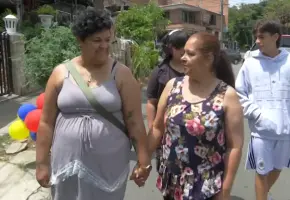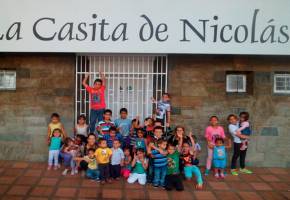In Sweden, they propose banning adoptions of children from Colombia and other countries. Why?
An investigation found that in several cases minors were declared dead in order to steal their identities.
From babies declared dead by mistake to parents who never gave their consent, a report commissioned by the Swedish government revealed serious irregularities in international adoptions with countries like Colombia and proposed banning them altogether.
Nearly 60,000 people have been adopted in Sweden from foreign countries , according to the Family Law and Parental Support Authority. The top five countries of origin are South Korea, India, Colombia, China, and Sri Lanka. However, others, such as Chile, also appear on the list.
You may be interested: Yolanda was abandoned in Bello in 1967 and has been searching for her biological family for over 40 years.
“Imagine someone erasing your story,” said Lisa Gauffin Dahlin, a 30-year-old lawyer, during a meeting in Stockholm on Monday. “It’s an open wound,” says this activist from Chile Adoption, an organization for adoptees from the South American country.
For several decades, children were adopted without their parents' free and informed consent, wrongly declared dead, or given up for adoption by someone other than their parents , explained Special Rapporteur Anna Singer, who submitted her report to the Minister of Social Services.

A Swedish woman who was adopted 36 years ago reunited with her biological mother in Bello.
In other cases, parents gave their consent without fully understanding the significance of consent for an international adoption. The rapporteur also revealed significant and systemic deficiencies in Swedish documentation on the origins of these children.
These documents identified false details such as “the date of birth, information about the parents, as well as the circumstances and reasons” for the adoption.
The investigation also showed that the government was aware of these irregularities, the exact number of which was not disclosed by the commission.
A dozen cases of child trafficking were also confirmed from the 1970s to the 2000s, primarily in the context of private adoptions from Sri Lanka, Colombia, Poland, and China, Singer said.
“It’s very important that research has been done” on the topic, said Hanna Wallensteen, a 54-year-old psychotherapist adopted from Ethiopia in 1971.
For her, what needs to be done now is to support adopted people.
“Since our identity has been erased, we can't know who our parents were, where we came from, what our culture was, our religion... Is there still someone thinking about us somewhere?” she asked.

Concert for the children of Nicolás's House
“I think most of us grew up hearing: nobody wanted you, nobody could take care of you, this country is too poor , it can't take care of babies—an extremely negative narrative,” Wallensteen recounts.
“Living without knowing your identity can affect you deeply,” she added during the meeting with other adoptees.
"This is combined with the idea that we should be grateful to have grown up here. But having had a beautiful life is not incompatible with having been a victim of a human rights violation," she stated.
The commission of inquiry proposed banning all international adoptions and that Sweden publicly apologize to those affected.
“The State must recognize the human rights violations that occurred,” insisted Singer, the special rapporteur.
For a long time, Swedish legislation's primary objective was to facilitate international adoption.
Responsibility for this activity fell to private adoption organizations, which were interested in ensuring that as many children as possible were adopted, the rapporteur explains.
International adoptions have declined dramatically in Sweden since the 1980s, according to data from Adoptionscentrum, the country's largest mediation organization.
In 1985, more than 900 children had been adopted abroad, compared to 14 since the beginning of 2025.